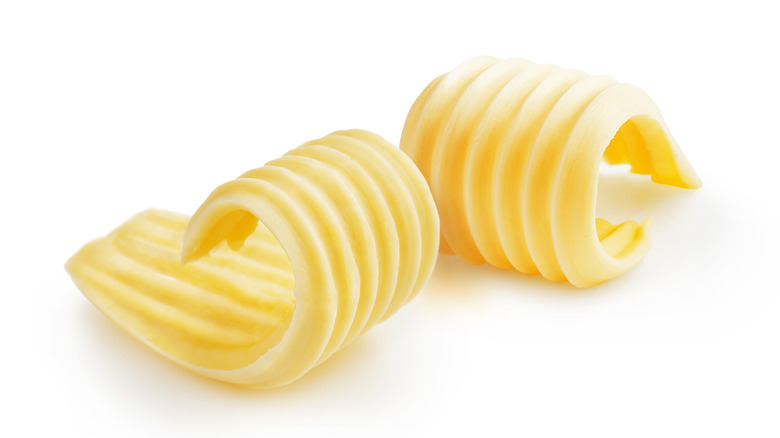Butter Is More Nutritious Than You Might Have Thought
If you feel just a bit guilty as you smear (ok, slather) some butter on your toast, you're not alone. Since the 1980s, fat has been seen as the enemy to good health, notes Eat This, Not That!. And since butter is primarily fat (the reason it tastes so good!), it also fell into the not-so-good-for-you category. However, since then, studies have shown that not all fats are created equal, and saturated fats, which butter contains a lot of, are actually "neutral from a heart health perspective," reports Harvard Public Health. Not only that, but butter actually has some nutritional value as well.
Butter is a source of vitamins A, B12, D, E, and K, nutrients that are needed for healthy eyes, skin, immune function, teeth, bones, energy, and may reduce the risks of certain cancers. Moreover, several of those vitamins (A, D, E, and K) are fat-soluble, which means they require some fat for our bodies to absorb them properly. Butter also contains iodine, something our bodies cannot make but need for our thyroid glands to work properly, along with small amounts of other nutrients like calcium, riboflavin, niacin, and phosphorous, per Healthline.
Butter may have additional health benefits
According to Healthline, butter is also a great source of conjugated linoleic acid, which may have anticancer, weight management, and immunity boosting properties. It's also a good source of butyrate, a short-chain fatty acid with anti-inflammatory properties that may improve digestive health and insulin sensitivity, and metabolism rates. Butter is also a good fat for cooking — it's stable in heat and doesn't turn into trans fat like vegetable oils do when cooked in heat, nutrition consultant Lauren Minchen explains to Real Simple.
However, butter is high in saturated fat and calories. Just one tablespoon of unsalted butter contains 102 calories and 12 grams of fat (via WedMD), which means you'll want to enjoy it in moderation. So, while you should go ahead and make that brown butter to put on top of popcorn, roast veggies, and baked goods, or a tasty compound butter for your steak without any feelings of guilt, just be sure to limit yourself to about one tablespoon of butter per day, which is what Wendy Bazilian, a registered dietitian, recommends to Eat This, Not That!, taking into account the fact that your daily diet will likely include other sources of saturated fats as well.

